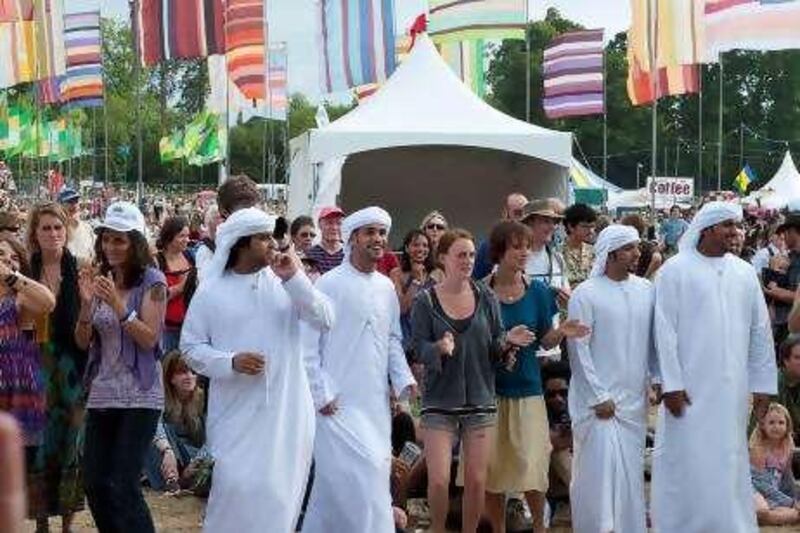ABU DHABI // The music, dance and poetry of the UAE are being showcased on the world stage thanks to a flurry of projects from Abu Dhabi Authority for Culture and Heritage (Adach).
On Sunday, Zayed and the Dream, an extravagant musical about the rise to leadership of Sheikh Zayed, the founding President of the UAE, opens in London. Last weekend, the seven-piece band Takht al Emarat performed to thousands who attended the Womad music and dance festival in the English county of Wiltshire. And at the same festival, the newly formed Abu Dhabi Folk Dance Group also gave its first international performance.
Thousands of miles away in Morocco, Mohammed Bin Hammad al Kaabi, one of the UAE's leading poets, performed a recital to a packed house during the 32nd annual Assilah Festival. The shows are all part of Adach's strategy to strengthen intercultural dialogue and introduce Emirati culture and traditions to the rest of the world, said Abdullah al Ameri, the director of the department of culture and arts at the authority.
He called Womad one of the most important music festivals in the world and added that the UAE was a guest of honour at the Moroccan annual arts festival. The various performances, Mr al Ameri said, "stress the pursuit of the authority to execute its strategic plan to preserve local heritage and to introduce it to the whole globe, not just the Arab world" . The deputy director of the department, Dr Sami el Masri, said that while the capital was well known internationally for its oil, tourism and landmark projects such as Masdar City, it was their responsibility to "show the real face and identity of the country".
Mohammed Khalaf al Mazrouei, the director general of Adach, added: "We are proud to perform this work all over the world. "We are gratified that it has been well received and that what Sheikh Zayed has given to his country and to his people, as well as to the Arab and Muslim nations and the rest of humanity, has been highly appreciated." Zayed and the Dream was produced by the Lebanon's Caracalla Theatre - the only professional dance theatre in the Middle East.
The show is an exploration of Sheikh Zayed's character told through an imaginary plot in which he is raised by seven horsemen, each representing a vital virtue, including honour, courage or justice. Zayed and the Dream was launched in Abu Dhabi on National Day last year. In May, it was staged in Paris, where 6,500 people came to see two shows at Le Palais des Congrès Theatre. The two shows, which will be hosted at London's Coliseum on August 1 and 3, have been described in previews as "spectacular" and "utterly ravishing".
Dr el Masri said these were just a few examples of the broad scope of cultural programmes coming from the capital. "[These] are just a small portion of the vast and extensive portfolio of work that we have undertaken. These products are part of our strategic direction to curate and develop cultural products of international significance," he said. The UAE's participation at the Assilah Festival, which ran from July 10 to 27 and drew more than 200,000 visitors, included a live painting of a mural by artist Abdulrahman al Maini, which was placed in the central square of the festival, an exhibition about the book industry hosted by Kitab and Qalam and the screening of nine short films.
Al Kaabi recited his poetry, which touches on themes such as loss, hope and passion, on Saturday night at the Hassan II Centre in the Moroccan town. He said it was an "honour" to represent his country. The festival's programme was "made to fill in the gaps in the area of culture regionally", said Dr el Masri. Speaking after his performance at the Womad festival on Saturday, Ali Obeid, the manager and lead performer of the band Takht al Emarat, said he was extremely proud to have represented his country on a world stage.
Many people told the 30-year-old performer, who is from Fujairah, that the show marked the first time they had seen an oud being played. "Through our music we showed people another way of life and something different," he said. "Most foreigners listen to Moroccan music and think this is the way all Arabs play, but in reality all countries have their own style. "I feel happy to have been given the chance to show people about the UAE and our music. It was our pleasure."
Mr Obeid said his band had been invited to play in South Korea and hoped to be able to return to the UK next summer. Nasser al Junaibi, the director of performing arts in Adach and founder of the Abu Dhabi Dance Folk Group of 40 artists, said the international performances were vital to showing the rest of the world about the deep-rooted Emirati musical traditions. "[They] shed light on our rich cultural history," he said.
@Email:aseaman@thenational.ae






